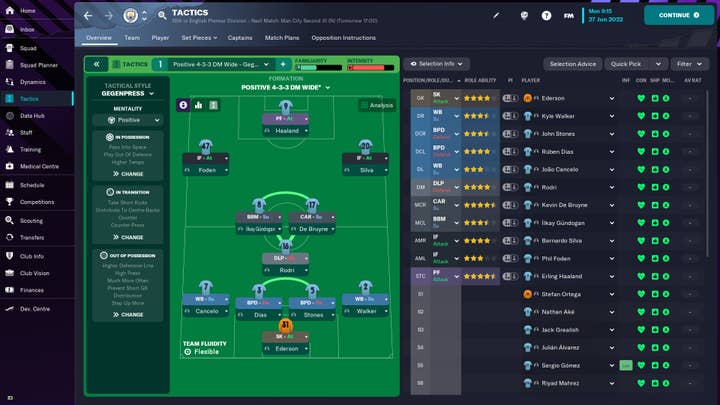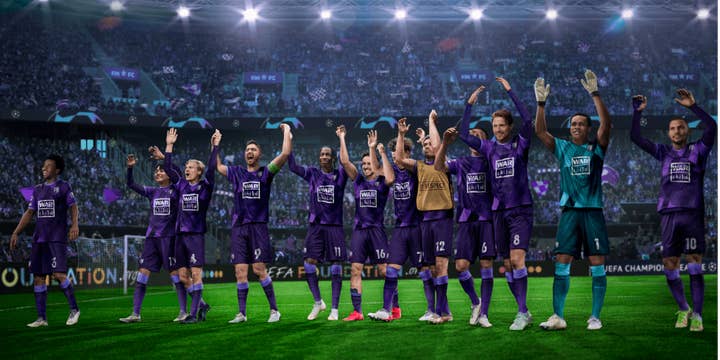Why it took 20 years to start making a true Football Manager sequel
Miles Jacobson talks us through the preparations for the biggest shift in the series' history
Sign up for the GI Daily here to get the biggest news straight to your inbox
Like most annual franchises, Football Manager is not built from the ground up every year. The game is iterated upon, with various improvements and additions keeping the game fresh while still holding true to everything Sports Interactive has built before.
This, however, is about to change.
While Football Manager 2024 – which is expected to release this November – will be another annual iteration, it will be the last of its kind, with the developer recently announcing it will overhaul everything and even switch engine for next year's Football Manager 2025 – a title that studio director Miles Jacobson describes as "the first true sequel" in the series.
"This is a real opportunity for us to look at every area of the game, and go, 'Would we do it the same way if we were starting again?'," he tells GamesIndustry.biz. "This is a proper sequel that we're working on at the moment, in the background, while working on FM24, with full resources on both titles, because we've grown the studio so much to be able to work in this way. It's a new way of thinking for us as a studio."

The studio is still dedicated to work on FM24 and this year's iteration is actually being built up as the finale of Football Manager's first 20-year chapter. The studio boss tells us FM24 is designed to be the definitive Football Manager – at least in terms of the current format.
Jacobson even tells us the studio has been hinting at this reinvention for a while now. The branding and promotion for FM22 began introducing rips into the logo, which became more prominent in the following title, and taglines like 'Tear up the script' foreshadowed the changes that are to come.
"[That's] something only we are ever going to notice in the studio," Jacobson laughs. "But that was meant to be, 'We're ripping it up because we're now moving to something brand new.' We just happen to have done that a year early on the branding, compared to when we are actually ripping it up."
So what exactly is Sports Interactive ripping up? Jacobson can't go into details, but he emphasises again that FM25 is being built as if the team was starting from scratch, boosted by two decades of experience.
The studio is able to draw on completely anonymised data regarding how much time players spend on the hundreds of screens and menus available in Football Manager, monitoring which features they use, and redesigning FM25's UI accordingly. The aim, Jacobson says, is to create "the most efficient, easy-to-use user interface that we possibly can."
The biggest change for FM25 is the shift to Unity. The series has been built with the studio's proprietary tech, known as SIOS (Sports Interactive Operating System). FM25 marks the first time the team is using an external engine.
Jacobson tells us he's "very happy" with the progress so far, particularly with the game's visuals and the 3D match engine that simulates football matches.
"This is a real opportunity to look at every area of the game, and go, 'What would we do if we were starting again?'"
"Our artists are awesome, but if the tools that you're working with aren't great, then that becomes a problem," he explains. "If Picasso had to do all of his work in Sharpies and Crayola, it probably wouldn't look as good as it did, right? Our art team being able to show us how good they are is a definite bonus from moving engine.
"If you talk to most studios who've been working on their own engine, it's just not possible to invest as much into the engine as any of the providers, because they've got lots and lots of customers."
He adds: "It's possible to [improve our own tech], but when you weigh up the cost/benefit analysis, making improvements to the renderer and some of the lighting improvements that we're going to get out of the box from using other engines, [those] are just things that are really, really expensive in terms of time, and [that] would get in the way."
Jacobson says it was the engine team who conducted an investigation, known internally as Project Dragonfly, into alternative engines and the choice of Unity was based on their recommendation. He also emphasises that the entire team is being retained, although some of their roles will change.
He adds that the move to Unity will mean a change in the game's system specifications. These have remained largely unchanged for years, supporting 20-year-old machines where possible – in fact, while it's not officially supported, Jacobson reports that Football Manager still works on Windows 7. FM25, however, will require slightly more recent PC rigs, although Jacobson still hopes to support machines that are 12 to 15 years old.

Sports Interactive is working closely with the engine provider to get the extra tools necessary to achieve what it needs with FM25 – and, as happens with Unity's partnerships, this is likely to feed back into overall engine improvements for other customers.
"Most studios who are using [commercial] engines still do extra work to deliver things that they have a specific use case for, and we're no different with that," Jacobson says. "It's not just a case of you buy it off the shelf and the game's just going to work."
Many studios are shifting to Unity or Unreal, in part for those benefits of added resource from the engine providers but also because it's easier to hire people who are already experienced with the available tech. But Jacobson does not believe we're seeing the decline of proprietary engines.
"There are always going to be teams that want to be working from their own engine and have complete control over everything," he says. "At scale, that is very difficult to do if that engine is only being used by one studio and [it doesn't] have unlimited budget. So, there will still be people out there who will be using proprietary engines, particularly studios that are owned by platform holders, who maybe don't have the same profit needs that other developers have. There will be super cool indie studios who don't have the same time pressures that some other studios have.
"But if you're working to tight schedules, as we are on annual iterations, then what I've learned from Project Dragonfly, it's definitely the right decision for us to be moving. But then there are other studios at Sega who've gone through the same process and who've decided that for them, the best thing is to continue with their own engine. I think it's different for different studios."
""It's just bonkers [for a niche game] to have five million people. Thank you Game Pass, Apple Arcade [and] PlayStation. And thank you to the consumers who've tried the game for the first time"
There are more changes behind the scenes. Prior to 2020, Sports Interactive employed around 100 people, but Jacobson reports it now stands at just shy of 290. This has necessitated a different management structure (previously, everyone essentially reported to Jacobson), and the studio has become a lot more organised. As such, work on this year's FM24 and next year's FM25 began much earlier than usual.
"At the moment, I'm not really having design meetings on FM24. Historically, there would have been design meetings [because] we still wouldn't know the full feature set by now. But the feature set has been known for a while. There are still some things that might get dropped along the way, but we know what those are. We've got prioritisation set up in a way that if something overruns, there's something else that can be moved to a future game. So, we're a lot more organised.
"All the design meetings I'm having at the moment are about FM25, because of the way that we structured ourselves. [Now we have] good processes inside the studio that work, rather than flying by the seat of our pants, which we may have done historically – and that's usually on me."

It's a smart time to be ramping up as Football Manager has grown significantly as a franchise in the past year. Prior to FM23, each title usually peaked around two million players per year. Now it's over five million.
"[It's] just bonkers," says Jacobson. "We are a niche game, right? To have five million people? Thank you Game Pass. Thank you Apple Arcade. Thank you PlayStation. And thank you to the consumers who've tried the game for the first time."
"It may be that there isn't another true sequel for 30 years, but I expect that would be somebody else's decision, not mine"
He adds that this "doesn't necessarily change the way that [SI] designs stuff," but instead gives the studio a better understanding of how a larger number of people play Football Manager. Sports Interactive dedicates a lot of time to monitoring how different types of players, from casual newcomers to long-running hardcore fans, interact with the game – and how each category grows..
"We need to make sure that the balance is there, so that there are features for the hardcore of the hardcore, and there are features for the person that's never played the game before, and all of the player types in between," he says. "We can't pick out one person out of that five million, and go, 'Hey, this feature is for Roger in Halifax'."
With 20 years of Football Manager feeding into the first true sequel, does Jacobson expect to spend another two decades honing this new vision of the series before tearing up the script again?
"I'll probably be dead in 20 years, so you'll have to ask someone else that," he laughs. "I'm in my 50s now! I talk internally at the studio that we're setting up for the next 30. So, it may well be that there isn't another true sequel for 20, 30 years, but I would expect that would be somebody else's decision by then, and not mine.
"If there is a need to have a true sequel again, then there'll be one. I believe now there is a need for a true sequel. But the way that we're setting things up at the moment is very much with a long-term view."
Sign up for the GI Daily here to get the biggest news straight to your inbox

